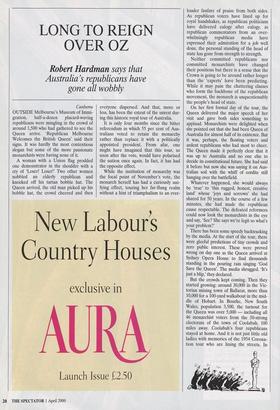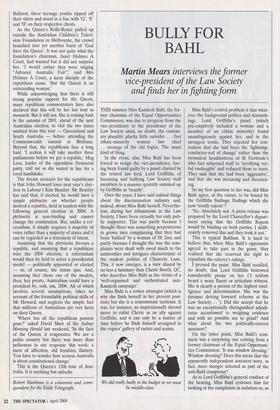LONG TO REIGN OVER OZ
Robert Hardman says that
Australia's republicans have gone all wobbly
Canberra OUTSIDE Melbourne's Museum of Immi- gration, half-a-dozen placard-waving republicans were mingling in the crowd of around 1,500 who had gathered to see the Queen arrive. 'Republican Melbourne Welcomes the British Queen' said their signs. It was hardly the most contentious slogan but some of the more passionate monarchists were having none of it.
A woman with a Union flag prodded one demonstrator in the shoulder with a cry of 'Loser! Loser!' Two other women nobbled an elderly republican and knocked off his tartan bobble hat. The Queen arrived, the old man picked up his bobble hat, the crowd cheered and then everyone dispersed. And that, more or less, has been the extent of the unrest dur- ing this historic royal tour of Australia.
It is only four months since the bitter referendum in which 55 per cent of Aus- tralians voted to retain the monarchy rather than replace it with a politically appointed president. From afar, one might have imagined that this tour, so soon after the vote, would have polarised the nation once again. In fact, it has had the opposite effect.
While the institution of monarchy was the focal point of November's vote, the monarch herself has had a curiously uni- fying effect, touring her far-flung realm without a hint of triumphalism to an ever- louder fanfare of praise from both sides. As republican voters have lined up for royal handshakes, as republican politicians have delivered eulogy after eulogy, as republican commentators from an over- whelmingly republican media have expressed their admiration for a job well done, the personal standing of the head of state has gone from strength to strength.
Neither committed republicans nor committed monarchists have changed their positions but there is a sense that the Crown is going to be around rather longer than the 'experts' have been predicting. While it may pain the chattering classes who form the backbone of the republican movement, the monarch is unquestionably the people's head of state.
On her first formal day of the tour, the Queen delivered the major speech of her visit and gave both sides something to applaud. Monarchists were delighted when she pointed out that she had been Queen of Australia for almost half of its existence. But it was, perhaps, the floating voters and ardent republicans who had most to cheer. The Queen made it perfectly clear that it was up to Australia and no one else to decide its constitutional future. She had said it before but now she was saying it on Aus- tralian soil with the whiff of cordite still hanging over the battlefield.
Whatever happened, she would always be 'true' to 'this rugged, honest, creative land' whose 'joys and sorrows' she had shared for 50 years. In the course of a few minutes, she had made the republican cause respectable. The defeated reformers could now look the monarchists in the eye and say, 'See? She says we're legit so what's your problem?'
There has been some speedy backtracking by the media. At the start of the tour, there were gleeful predictions of tiny crowds and zero public interest. These were proved wrong on day one as the Queen arrived at Sydney Opera House to find thousands standing in the pouring rain singing 'God Save the Queen'. The media shrugged. 'It's just a blip,' they declared.
But the crowds kept coming. Then they started growing: around 30,000 in the Vic- torian mining town of Ballarat, more than 10,000 for a 100-yard walkabout in the mid- dle of Hobart. In Bourke, New South Wales, population 3,500, the turnout for the Queen was over 5,000 — including all 46 monarchist voters from the 50-strong electorate of the town of Coolabah, 100 miles away. Coolabah's four republicans stayed at home. And it is not just little old ladies with memories of the 1954 Corona- tion tour who are lining the streets. In Ballarat, three teenage youths ripped off their shirts and stood in a line with 'Q', `E' and `II' on their respective chests.
As the Queen's Rolls-Royce pulled up outside the Australian Children's Televi- sion Foundation in Melbourne, the crowd launched into yet another burst of 'God Save the Queen'. It was not quite what the foundation's chairman, Janet Holmes A Court, had wanted but it did not surprise her. 'I would rather they were singing "Advance Australia Fair",' said Mrs Holmes A Court, a keen disciple of the republican cause. 'But the Queen is an outstanding woman ' While acknowledging that there is still strong popular support for the Queen, many republican commentators have also declared that this will be her last tour as monarch. But it will not. She is coming back in the autumn of 2001, ahead of the next Australian election, to visit the two states omitted from this tour — Queensland and South Australia — before attending the Commonwealth summit in Brisbane. Beyond that, the republicans face a long haul. `I reckon it will take another three parliaments before we get a republic,' Meg Lees, leader of the opposition Democrat party, told me as she waited in line for a royal handshake.
The dream scenario for the republicans is that John Howard loses next year's elec- tion to Labour's Kim Beazley. Mr Beazley has said that, if elected, he would have a simple plebiscite on whether people desired a republic, held in tandem with the following general election in 2004. A plebiscite is non-binding and cannot change the constitution. But, unlike a ref- erendum, it simply requires a majority of votes rather than a majority of states and it can be regarded as a statement of intent.
Assuming that the plebiscite favours a republic, and assuming that a republican wins the 2004 election, a referendum would then be held to select a presidential model — politically appointed or elected — or, of course, the status quo. And, assuming they chose one of the models, then, hey presto, Australians could have a president by, ooh, um, 2006. All of which involves several assumptions, takes no account of the formidable political skills of Mr Howard, and neglects the simple fact that millions of Australians are very keen on their Queen.
`Where has all the republican passion gone?' asked David Marr of the Sydney Morning Herald last weekend. 'In the face of the Queen, it evaporates. We are a polite country but there was more than politeness in our response this week: a mess of affection, old loyalties, flattery, You have to wonder how serious Australia is about constitutional change.'
This is the Queen's 13th tour of Aus- tralia. It is anything but unlucky.
Robert Hardman is a columnist and corre- spondent for the Daily Telegraph.























































































 Previous page
Previous page